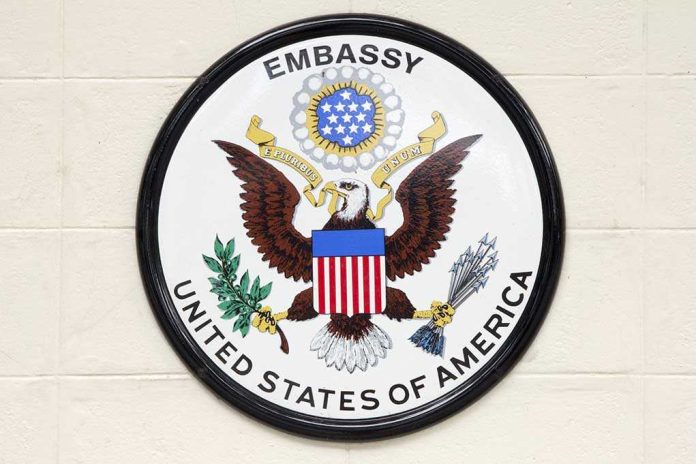
The arrest of a U.S. Embassy guard in Oslo for spying on behalf of Russia and Iran has sent shockwaves through Western diplomatic circles, raising urgent questions about the vulnerability of key security positions.
At a Glance
- A 27-year-old Norwegian security guard at the U.S. Embassy in Oslo has been charged with espionage for Russia and Iran.
- This incident underscores the persistent threat of espionage against Western diplomatic missions.
- Norway, a NATO member and close U.S. ally, is a high-value target for adversarial intelligence services.
- The accused is in custody, with a trial pending, as Norwegian authorities conduct a broader security review.
Espionage in Oslo: A Growing Threat
A Norwegian man, employed as a security guard at the U.S. Embassy in Oslo, has been charged with espionage for both Russia and Iran. This incident has highlighted the ongoing and intensifying threat of espionage against Western diplomatic missions. Given the geopolitical tensions following Russia’s 2022 invasion of Ukraine, this case is a stark reminder of the lengths to which adversaries will go to infiltrate and undermine NATO allies.
The man, whose identity remains undisclosed, allegedly shared sensitive information with foreign intelligence services while working at the embassy. Norwegian prosecutors have formally charged him, and he is currently in custody awaiting trial. The arrest follows a covert surveillance operation initiated by Norwegian security services earlier this year, as they noticed suspicious activities at the embassy.
Why Norway Is a Target
Norway’s strategic importance as a NATO member and its proximity to Russia make it a key target for espionage. The U.S. Embassy in Oslo, involved in Arctic security and energy policy, is particularly enticing for adversarial intelligence services. Russia and Iran, known for their sophisticated espionage tactics, have long targeted Western interests in Europe.
Historically, espionage targeting Western embassies is nothing new. During the Cold War, the Soviets maintained extensive intelligence operations across Europe, a legacy that continues with Russia today. Iran, on the other hand, has increased its intelligence activities in Europe, often focusing on Western interests and dissidents. This latest case is a continuation of such efforts, underscoring the need for heightened vigilance.
The Players Involved
The accused security guard was likely motivated by a combination of financial incentives and ideological alignment. Norwegian prosecutors and security services are at the forefront of the investigation, tasked with unraveling the full extent of the espionage activities. Meanwhile, the U.S. Embassy, as the primary target, is conducting internal reviews to assess the potential damage and tighten security measures.
The larger geopolitical dynamics involve Norwegian and U.S. authorities closely collaborating to counter threats from Russian and Iranian intelligence agencies. With Norway being a close U.S. ally, the stakes are high in ensuring that sensitive diplomatic and security information remains protected from adversarial forces.
Potential Consequences
This incident could have significant short and long-term implications. In the immediate future, there will likely be a stringent review and tightening of security protocols at the U.S. Embassy in Oslo and potentially other U.S. diplomatic missions across Europe. Staff and contractors with access to sensitive areas will face heightened scrutiny.
Over the long term, this case could strain diplomatic relations between Norway, the U.S., Russia, and Iran. It may lead to increased investment in counterintelligence measures and vetting procedures for embassy personnel. The potential diplomatic fallout might also see retaliatory actions, such as the expulsion of Russian and Iranian diplomats from Norway or allied countries.
Sources:
Wikipedia: Russian invasion of Ukraine
The Week: Timeline of Russia-Ukraine war
World Economic Forum: Ukraine war timeline



